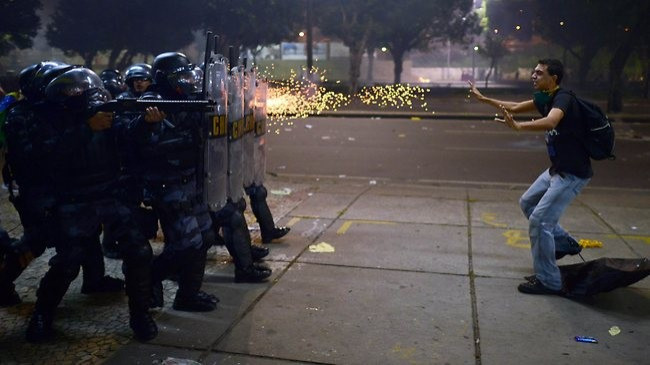Brazil Protests: 250,000 Take to Streets Despite President's Plea for Calm

Thousands of demonstrators clashed with police as fresh protests erupted in cities across Brazil, despite an appeal for calm by President Dilma Rousseff.
An estimated 250,000 people in more than 100 cities took to the streets overnight, according to police, with violence reported in some areas despite Rousseff's call for an end to the violence.
Ending several days of silence, Rousseff promised to improve public services and fight harder against corruption, outlining a raft of social reform proposals she hoped would ease the tensions.
Across the nation, people gathered to denounce legislation known as PEC 37, which would limit the power of federal prosecutors to investigate crimes. Many fear the measure would hinder attempts to jail corrupt politicians.
In the southeastern city of Belo Horizonte, more than 70,000 people rallied outside the Mineiro stadium chanting "the Cup for whom?" as Mexico and Japan took part in a Confederations Cup game ahead of next year's World Cup.
Police fired tear gas as demonstrators hurled stones and tried to break through the stadium's security barrier. At least 15 people were injured in the clashes.
During her pre-recorded TV address on Friday, Rousseff vowed to fight corruption and promised to meet protesters, governors and mayors of big cities to discuss ways of improving transport and how to use oil royalties to invest in education.
Protesters planted 500 footballs in the sand at Copacabana beach in Rio to symbolise the 500,000 murders that have taken place in Brazil over the last decade.
The footballs were also seen as a reference to the vast sums of money being lavished on the World Cup, which has been one of the themes of the mass protests that began over bus fares.
Mattheus Mendes Costa, a student who helped create the display, said the spending on stadiums had awakened the country to what it could achieve.
"It's frustrating that we have spent double what anyone else paid in preparing for the World Cup but our social projects don't get the same attention," he told Sky News.
"People want that to change now. We want hospitals, schools, and security all to Fifa standard."
The demonstration was organised by Rio Paz (Rio Peace), an NGO which works to reduce the murder rate in the favelas, or shanty towns in the mountains around Rio.
Rio Paz director Antonio Costa said: "We are the seventh biggest economy in the world but one of the most socially imbalanced.
"We have the fourth most crowded prisons, and just a few people have 60% of the country's wealth. They are the ones who influence all the political decisions."
Many demonstrators have criticised inequality, saying the nation's wealth must be enjoyed by a greater number.
About 40 million Brazilians have crossed the poverty line in the last decade.
Rousseff recalled her Marxist revolutionary background, saying she had helped bring wealth and democracy to the people when she fought against Brazil's 1964-1985 military regime.
Seeking to appease protesters with social reform policies, she said her struggle had given them the right to demonstrate.
"My generation fought a lot so that the voice of the streets could be heard," Rousseff said. "Many were persecuted, tortured and many died for this."
The president will hope her standing as a revolutionary can help her ride out the wave of protest. On the streets, however, there is a mood that the people were seizing political control.
"I think it's going to be a time of big change in Brazil, because for the first time in 20 years we've frightened the political class," Antonio Costa said.
© Copyright IBTimes 2025. All rights reserved.





















